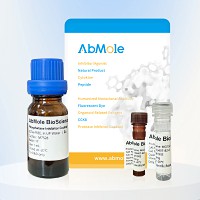All AbMole products are for research use only, cannot be used for human consumption.

Expression host: HEK293 cells
Molecular weight: Human CD19 Protein contains 271 amino acids and has a predicted theoretical molecular weight of 31.8 kD
Molecular aliases: CD19, B4, CVID3, MGC12802
Purity: ≥95% Was analyzed by SDS-PAGE gel and HIGH performance liquid chromatography
Endotoxin: < 0.1EU/μg
Storage and stability: Freeze-dried samples can be stored at 4℃ for 24 months, dissolved liquid can be stored at -20℃ for 6-12 months, and avoid repeated freeze-thaw
Bioactivity: The B lymphocyte antigen CD19, also known as Cluster of.erention 19(CD19), is a one-way type I membrane protein containing two ig-Likec2-type (.globulin-like) domains. CD19 was expressed in follicular dendritic cells and B cells. In fact, it is present on B cells, from early recognized B line cells during development to B cell mother cells, but lost to plasma cells at maturity. It primarily acts as a B cell co-receptor with CD21 and CD81. Upon activation, the cytoplasmic tail of CD19 is phosphorylated, leading to the binding of SrC-family kinases and recruitment of Pi-3 kinase. As with T cells, some surface molecules form antigenic receptors that form complexes on B lymphocytes. Most B-cell specific CD19 phosphoglycoproteins are one of these molecules, the others are CD21 and CD81. These surface immunoglobulin (sIg) -associated molecules promote signal transduction. On living B cells, anti-immunoglobulin antibodies mimic exogenous antigens to bind CD19 to and internalize sIg. The opposite process has not been confirmed, suggesting that the formation of this receptor complex is antigen-induced. This combination of molecules has been confirmed by chemical studies. Mutations in CD19 are associated with severe immunodeficiency syndrome, which is characterized by reduced antibody production. CD19 has been shown to interact with CD81, CD82, complement receptor 2, and VAV2.
| Storage |
Powder -20°C 3 years ; 4°C 2 years In solvent -80°C 6 months ; -20°C 1 month |
[1] Ruihao Huang, et al. J Hematol Oncol. Recent advances in CAR-T cell engineering
[2] Carl H June, et al. N Engl J Med. Chimeric Antigen Receptor Therapy
[3] Michel Sadelain, et al. Nature. Therapeutic T cell engineering
[4] Kathrin Pieper, et al. J Allergy Clin Immunol. B-cell biology and development
| Related Cytokines and Growth Factors Products |
|---|
| Recombinant Human GDF-15 Protein (HEK293 N-hFc)
Growth-differentiation factor 15 (GDF15), also known as MIC-1, is a secreted member of the transforming growth factor (TGF)-β superfamily. GDF-15 has a role in regulating inflammatory and apoptotic pathways in injured tissues and during disease processes. GDF-15 overexpression arising from an expanded erythroid compartment contributes to iron overload in thalassemia syndromes by inhibiting hepcidin expression. |
| Recombinant Human FGFR1 Protein (HEK293, C-His)
FGFR1, also known as CD331, is a full-length representative protein consists of an extracellular region, composed of three immunoglobulin-like domains, a single hydrophobic membrane-spanning segment and a cytoplasmic tyrosine kinase domain. |
| Recombinant Human FGFR2 Protein (HEK293, C-His)
FGFR2, also known as CD332, acts as cell-surface receptor for fibroblast growth factors and plays an essential role in the regulation of cell proliferation, differentiation, migration and apoptosis, and in the regulation of embryonic development. FGFR2 plays an essential role in the regulation of osteoblast differentiation, proliferation and apoptosis, and is required for normal skeleton development. It also promotes cell proliferation in keratinocytes and imature osteoblasts, but promotes apoptosis in differentiated osteoblasts. |
| Recombinant Mouse BMP-4 Protein (E. coli, C-His)
Bone Morphogenetic Protein-4 (BMP-4) is a critical signaling molecule required for the early differentiation of the embryo and establishing of a dorsal-ventral axis. BMP-4 is secreted from the dorsal portion of the notochord, and it acts in concert with sonic hedgehog to establish a dorsal-ventral axis for the differentiation of later structures. |
| Recombinant Human Coagulation Factor X (HEK293, C-Fc)
Coagulation factor X, belongs to the peptidase S1 family. Coagulation factor X is initially synthesized in the liver. Coagulation factor X is a vitamin K-dependent glycoprotein that converts prothrombin to thrombin in the presence of factor Va, calcium and phospholipid during blood clotting. |
All AbMole products are for research use only, cannot be used for human consumption or veterinary use. We do not provide products or services to individuals. Please comply with the intended use and do not use AbMole products for any other purpose.


Products are for research use only. Not for human use. We do not sell to patients.
© Copyright 2010-2024 AbMole BioScience. All Rights Reserved.
